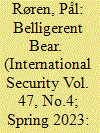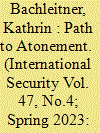|
|
|
Sort Order |
|
|
|
Items / Page
|
|
|
|
|
|
|
| Srl | Item |
| 1 |
ID:
191600


|
|
|
|
|
| Summary/Abstract |
Do states get higher social status from fighting? The prestige of war depends on the type of “status order” that it is interpreted in. Status orders condition and enable the pursuit and recognition of status within social clubs of world politics. Depending on the status order, social clubs may either value or stigmatize belligerence. An analysis comparing the status recognition that Russia received in three social clubs (the great power club, the G-8, and the UN Security Council) after it annexed Crimea and invaded eastern Ukraine in 2014 explores this assumption. The analysis shows that war generated different status effects on Russia's status within each of these clubs. Contrary to popular belief, and amid widespread condemnation, Russia was increasingly recognized as a great power within U.S. public discourse. In contrast, Russia's belligerence diminished its status within the G-8 and had little effect on its status in the UN Security Council. The findings underline the importance of context in estimating status effects of participating in wars and any other behavior that might impact a state's standing in world politics.
|
|
|
|
|
|
|
|
|
|
|
|
|
|
|
|
| 2 |
ID:
191603


|
|
|
|
|
| Summary/Abstract |
External state support to non-state armed groups is commonly seen as a direct relationship between a state sponsor and a rebel group. But powerful states often use third-party states as conduits of military aid. These intermediary states are secondary, subordinate principals that are part of extended chains of “dual delegation.” Because intermediaries are likely to have their own separate agendas, powerful states often face a double principal-agent problem when providing material support to rebel groups. The difficulties and problems associated with controlling the agent are reflected in the relationship between the principal and the intermediary. States need to identify the alignment of interests at an early stage, or risk strategic failure. There are two ideal types of intermediaries—dealers and brokers. Case studies of the United States’ support to the Mujahideen in Afghanistan and to UNITA in Angola (channeled through Pakistan and Zaire, respectively) demonstrate that intermediaries affect the provision of external support. States engaging in counterterrorism need to look beyond sponsors of terrorism and explore the role of all states involved in the process of conflict delegation. That states use intermediaries when providing support to non-state armed groups indicates that holding states accountable for violating the nonintervention principle under international law should be reconsidered.
|
|
|
|
|
|
|
|
|
|
|
|
|
|
|
|
| 3 |
ID:
191604


|
|
|
|
|
| Summary/Abstract |
Amid an intensifying rivalry with the United States, China is modernizing and significantly expanding its nuclear forces. These developments fuel concerns that China's traditional nuclear strategy premised on a limited nuclear arsenal for assured retaliation and a no-first-use policy is undergoing a major shift. Using Chinese-language materials, an examination of Chinese debates about China's security environment and the future direction of its nuclear strategy finds that a nuclear-conventional entangled security dilemma is emerging between the United States and China. The shift in the conventional balance of force in the region and the U.S. development of lower-yield nuclear weapons has led to greater fears in China of U.S. limited nuclear use in a conflict. Chinese strategists increasingly believe that U.S. nonnuclear strategic capabilities threaten China's nuclear forces. Although there is limited evidence of a shift in its nuclear strategy, China is changing its strategic posture to ensure its second-strike capability, including by relying on advanced conventional weapons (e.g., counterspace capabilities, cyber weapons, and electronic warfare) that can target U.S. missile defense. The dynamics of an entangled security dilemma may weaken arms race stability, and they underscore why it will be challenging for the United States to engage China in nuclear arms control.
|
|
|
|
|
|
|
|
|
|
|
|
|
|
|
|
| 4 |
ID:
191602


|
|
|
|
|
| Summary/Abstract |
Atonement is a state practice that comprises an official political apology and the offer of reparation payments to former victims of mass atrocities, war crimes, and human rights abuses. Despite being considered the moral and right thing to do, atonement has occurred only once at the state level: between West Germany and Israel in 1952. Whereas existing explanations view the West German pathway after the Holocaust as either an ethical choice or a domestic policy induced by U.S. pressure, atonement can also be a political decision. Politicians may give official apologies and pay reparations because such practices promise tangible political benefits. An investigation of the West German–Israeli case and a comparison with two non-atoning perpetrators of World War II, Austria and Japan, illustrate the plausibility of these claims. Atonement emerged as a bilateral strategy between West Germany and Israel because it represented a politically expedient option for both countries. This finding offers insights into when politicians may pursue atonement in other cases and points to a potential avenue toward long-term international stability and durable peace.
|
|
|
|
|
|
|
|
|
|
|
|
|
|
|
|
| 5 |
ID:
191601


|
|
|
|
|
| Summary/Abstract |
Disasters play a key role in debates about climate change, environmental stress, and security. A qualitative comparative analysis (QCA) investigates how major climate-related disasters shape the dynamics of ongoing armed conflicts. Quantitative and qualitative data are presented for twenty-one cases across Africa, Asia, and the Middle East. After climate-related disasters, 29 percent of these armed conflicts escalated, 33 percent de-escalated, and 38 percent did not change. Furthermore, only countries highly vulnerable to disasters experienced changes in conflict dynamics. Armed conflicts tend to escalate when the disaster induces shifts in relative power, whereby one conflict party (usually the rebels) subsequently scales up its military efforts. But if at least one conflict party is weakened by a disaster and the other lacks the capability to exploit this change, armed conflict intensity declines. Findings provide empirical support for a proposed power differential mechanism connecting climate-related disasters to armed conflict dynamics via short-term shifts in power relations between the conflict parties. Climate change can also act as a threat reducer by temporarily causing lower conflict intensity.
|
|
|
|
|
|
|
|
|
|
|
|
|
|
|
|
|
|
|
|
|